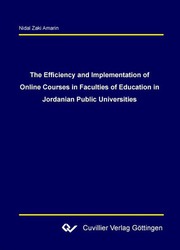| Departments | |
|---|---|
| Book Series (97) |
1381
|
| Nachhaltigkeit |
3
|
| Gesundheitswesen |
1
|
| Humanities |
2369
|
| Medienwissenschaften | 16 |
| Theology | 57 |
| Philosophy | 102 |
| Law | 423 |
| Economics | 851 |
| Social sciences | 417 |
| Sports science | 48 |
| Psychology | 233 |
| Educational science | 190 |
| History | 183 |
| Art | 111 |
| Cultural studies | 166 |
| Literary studies | 117 |
| Linguistics | 88 |
| Natural Sciences |
5408
|
| Engineering |
1795
|
| Common |
98
|
|
Leitlinien Unfallchirurgie
5. Auflage bestellen |
|
Advanced Search
The Efficiency and Implementation of Online Courses in Faculties of Education in Jordanian Public Universities (English shop)
Nidal Zaki Amarin (Author)Preview
Table of Contents, Datei (32 KB)
Extract, Datei (53 KB)
Information technology and/or computer-mediated communication (CMC) have become more complex than ever with the progress of science and educational technology. Advancements in technology, such as computers and telecommunications, have changed the way people work and how they are educated. Proper assessment is required to determine the strengths and weaknesses of any instructional delivery system. While a limited number of researchers have compared the differences of e¬learning courses to traditional courses, the study addresses factors other than student outcome (i.e. student satisfaction, locus of control and/or goal orientation, anxiety, self¬efficacy and motivation) in their learning environments.
Advances in technology also allow higher education to go “beyond the traditional classroom and deliver instruction and training to geographically diverse audiences locally, nationally and even internationally” (Rockwell, Schauer, Fritz, & Marx, 1999). With advances in distance education technology and an increase in demand for distance education, faculty members remain a key element in the process of teaching and learning (Rockwell et al., 1999). Therefore, it is necessary to focus on faculty members’ attitudes and specific factors (i.e. faculty members motivation towards online courses, their description of the concept of online courses, their plans for implementing online courses, faculty promotion, as they need to be qualified to teach in an online environment, faculty members tenure, …etc.) affecting faculty members’ participation in online courses.
As institutions of higher education launch online courses and e-learning offerings, it is important to identify factors that influence students and instructors participation in e¬learning education. Information obtained from this study may help institutions of higher education, faculty, administrators and researchers better understand the perspectives associated with students and faculty members in the different learning environments.
| ISBN-13 (Printausgabe) | 386727388X |
| ISBN-13 (Hard Copy) | 9783867273886 |
| ISBN-13 (eBook) | 9783736923881 |
| Final Book Format | A5 |
| Language | English |
| Page Number | 202 |
| Lamination of Cover | glossy |
| Edition | 1 |
| Volume | 0 |
| Publication Place | Göttingen |
| Place of Dissertation | Göttingen |
| Publication Date | 2007-10-12 |
| General Categorization | Dissertation |
| Departments |
Social sciences
|
| Keywords | Faculties of Education, Efficiency and Implementation, Jordanian Public Universities, Jordanian. |








